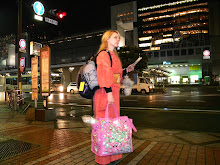
The last night we spend on the houseboat, my foot reaches a level of pain just a notch above unbearable. It is so painful I feel scared. I don't even mind the intense pain -- at least, not so very much -- but I mind the possibility of having seriously damaged my foot. I haven't exactly been following doctor's orders. And I'm a dancer, not just as a hobby but as one of the primary ways by which I define myself. Why had I been risking my ability to dance by traipsing through India with a broken bone?
Miserable with pain and regret, I huddle on the boat’s cushioned bench. Barely able to lift my head, I do not eat more than a few bites of supper. I have no more medicine except the last few pills I am determined to save for the 12 hour flight (including a layover in Hong Kong) back to Seoul. After seeing my condition, Katie decides we should skip going to the elephant temple in Alleppey and head directly back to Cochi the following morning.
But the thing is that no matter how poorly I'm feeling, the go-go-go of my personality is still stronger. The next morning in the car, as we speed our way through Alleppey, I feel a tiny diamond of energy left in my body. I want to spend it.
"You know what? I think I can manage a trip to the elephant temple," I tell Katie.
"Can you pass me the breakfast bag?" she responds. "I think I might throw up."
The supper which I'd felt too sick to eat the night before had apparently given Katie the south Indian variation of the dreaded Delhi belly.
I extract our breakfast, pass the bag, and wish her luck. I am disappointed to not have seen any of India's famous elephants during our time here, but even I am finally ready to admit defeat in this matter. They are the only thing on our India "wish list" that we did not get to see.
About 10 minutes later, while watching traffic zip past us out the car window, I think my eyes might be playing tricks on me. Clouds sweep the ground in the morning, so I can't see altogether clearly, but believe I can discern a large, grey shape moving through the white mist.
"Katie! Look!" I cry, excitement temporarily canceling the pain in my foot.
"Do you want to see better?" the driver asks with a kind smile. He pulls the car off to the side of the road and rolls down the window to give me the best view.
There, walking down the road through the dream-like mist of morning, is a large elephant and its mahout. The elephant's sinuous trunk swings gracefully from side to side as it lumbers forward. It passes so closely to the car that if I reach out my hand, I would be able to touch it.
I feel this elephant sighting, fulfillment of our final desire in India, is a special blessing, a sort of farewell gift.

Thank you, India.

















